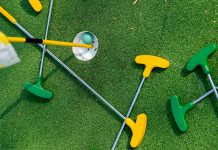Hurricane season lasts from June 1 – November 30. August is the most active month for hurricanes in the Atlantic Ocean. Hurricane preparedness is an essential piece of life in the sunshine state. Between peak hurricane season and the start of school, August can be an overwhelming month. I want to help ease that pressure, especially if you are new to Florida or are going into your first hurricane season.

Firstly, I want to say that while the threat of a hurricane is always present while living in the sunshine state, if you are well prepared, there is no reason to panic. Hurricane season is no reason to avoid moving to, living in or visiting Florida. There is so much fun to be had in this state! Between world class theme parks, beaches, museums, shopping and dining (to name a few), there is something for everyone in Central Florida. Hurricane season is a tiny piece of life here.
If you are prepared, worry about hurricane season can be in back of your mind – until it’s necessary. The great thing about hurricane preparedness, is that, once it is done, it requires little maintenance. There are plenty of lists to get you prepared for hurricane season in Florida – from the mom necessities, to the starter kits, to ways to prepare your home, to 5 steps to take to make you and your family ready.
But, as new Floridians, we needed a place to start from absolute zero.

What do you ACTUALLY need to be ready for a hurricane?
The following are a culmination of items that you should have on hand for a hurricane. A box specific for these items will make locating items easy and convenient if you have to evacuate.
Food/Water Needs
- Food: non perishable foods, a manual can opener and extra baby formula if your child needs it.
- Water: Account for one gallon per person per day. Have at least a 3 day supply of water, ideally 7 days.
Medical Needs
- Prescription medication – if you are close to needing a refill before a major storm hits, be sure to have at least 7 days worth of your medication on hand. If any of your medications need to remain cold, dedicate a cooler and ice to them.
- Non-prescription medication – make sure that you have full bottles of medication for yourself and your kids. There would be nothing worse than a little one spiking a fever and having no way to treat that in the middle of a storm.
- Battery operated thermometer
- Medications for your pets
- First Aid Kit
Home Necessities
- Toiletries
- Paper goods. Be sure to have plenty of toilet paper, paper towels, paper plates and utensils on hand. There would be nothing worse than being without toilet paper in the middle of a natural disaster. Also, who wants to be cleaning dishes during this time? Have some paper plates and plastic utensils around so you don’t have to worry about cleaning!
- Battery operated fans. No one wants to be without power, in a scary storm dripping in sweat. Make sure you have a fan (or two or three) that can operate off battery power to help keep you comfy!
- Spare batteries
- Generators. If you have a generator, be sure you have plenty of fuel for it and you are comfortable using it before a storm comes through.
- Battery powered sound machine for calm sleep. If your kids (or you) use a sound machine at night being able to provide a similar environment will hopefully make sure everyone gets some restful sleep.
- Solar powered lights and candles for light if you lose power
Other
- Make sure your phones, laptops, tablets and Kindle are at full charge before the storm hits. This way if you lose power, you still have access to some of the features of the devices to keep you and the kids entertained. Also be sure that any back up chargers are fully charged so you can remain connected as long as possible. Using a solar back up charger will allow you to remain plugged in through the duration of the storm.
- Collect games, cards and art projects to keep everyone entertained when being outside is unsafe. Some new toys or art projects that stay in the hurricane kit are a fun way to surprise your kids in the middle of a scary situation and will lighten the mood.
- Talk with your neighbors. Know who your neighbors are, what their plans are, if they are planning on leaving etc. This will help reduce stress on you if you know they are safe and you can develop a plan on how you can all work together to get through the storm. Your neighbors may also want to hang out with you during the hurricane – you can hold a hurricane party to keep spirits up through the chaos of the storm.
When should you take action?
When you first move to Florida (or any other state at risk to be hit with a hurricane), make your hurricane preparedness kit and develop an evacuation route. A good evacuation route should include a family meeting place if you get separated, planned routes out of the area, a plan for your pets and a portable emergency kit. Keep a radio on hand so that you can be constantly updated about conditions and stay off unsafe roads. If local government recommends that you evacuate, take the threat seriously and put your evacuation plan in place.
I know many joke about how Floridians aren’t scared of hurricanes – but do take them seriously. If local personnel deem it to be unsafe, be prepared and ready to evacuate if you are directed to do so.

When should you worry?
You won’t worry, because after you are done with this post and have your kit in place, you will be prepared. Nothing to truly worry about when you are ready to take action to keep you, your family, your pets and your home safe.
Listen to local professionals and always follow their guidance about evacuation. If your home is deemed to be at risk and local personnel tell you that your best action is to leave, grab your emergency kit, cash, pets and any other essentials you will need away from home. Please always follow this guidance. If you are not in an evacuation zone but want to go elsewhere during the storm, you are free to do so. In that scenario, you need to make the best choice for your family. The items you should take with you if you are leaving on your own accord remain the same.

Also, the risks to us in Central Florida during hurricane season are real. I’m not saying that to scare anyone, but to tell you the truth. Just because we are not close to the shore doesn’t mean that the wind and rain won’t be damaging this far in land. We are also not immune to flooding as a result of a hurricane. The storm will slow down once over land, but the conditions can still be very unsafe. Use caution if you stay in place during a hurricane and obey all directives from local personnel.
Tips & tricks from experienced Floridians:
Fill up your gas tank
In the case that you are directed to evacuate, you do not want to have to be waiting in hours long lines for gas. Time is of the essence if you are evacuating, so be ready before the storm hits by stopping at a gas station at the first sign of a hurricane. If you are able to stay in place but lose power, your car can be a place to go to get some reprieve from the Florida heat and use the A/C. If you are running your car without driving, make sure that you are safe and leave the garage door cracked so that you and your family stay safe from the carbon monoxide.

Fill up your bath tub with water
This water will allow you to flush toilets in case of a power outage but it should not be used for drinking water. The American Red Cross notes that it is unlikely that you would be able to sanitize the tub or filter this water enough to make it safe for drinking. Please account for your family’s water needs during a hurricane with about a gallon per person per day you’re expected to be without access to water and power. The ideal water supply should last you 7 days.
Get some cash
In the case of a wide spread power outage, it is a good idea to have some cash on hand so that you can buy supplies as necessary. If the power is out widespread, you will be unable to use a credit card.
Keep your food safe
Familiarize yourself with steps to take to keep your food safe for consumption during a hurricane. Think about what canned goods you can keep on hand to feed your family – fruits, vegetable and beans are great to have on hand. My recommendation would be to buy a couple cans here and there to have in the pantry and going into hurricane season, double check expiration dates on cans and use and replace any that are close to expiring.
Medical Considerations & Plans
I’ve touched on this before, but it is worth repeating… Be sure that you have plenty prescription and non-prescription medication for your human and pet family going into a hurricane. Make a plan for any medication that has to stay cold if you were to lose power. If you’re pregnant, there are some additional steps you should take if your due date in within hurricane season. Talk with your OB/GYN about their recommendations and any precautions they want you to take during this time – including how to contact them if you think you are in labor and where to go in the case of an emergency.





















